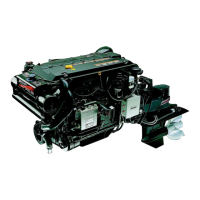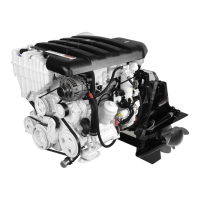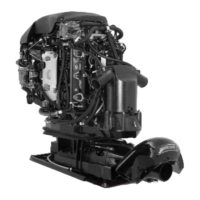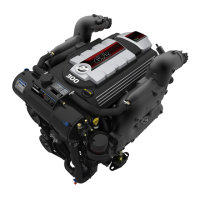DESCRIPTION SERVICE MANUAL NUMBER 22
Page 5A-12 90-860074--1 FEBRUARY 2002
ANALOG VALUE EVALUATION
To process the raw values there are three different loop frames: speed-synchronous (speed
interrupt-synchronous up to a max of 6 ms), fast time-synchronous (20 ms) and slow
time-synchronous (100 ms).
To evaluate the analog signals, the raw values are checked and converted. Checking
consists of a signal range check (SRC). Upon exceeding the valid signal range, a default
value is used for the raw values. As an example, an engine coolant temperature (ECT)
sensor malfunction would set an internal switch, causing a default value to replace the signal
from the defective ECT sensor.
The data set parameter is selected so that the default value is accepted over a ramp (time)
function or directly. If the raw value is again in a valid range after a SRC error, the new value
is brought to the current value.
The raw value is scaled by means of a curve. There are additional special routines for
evaluating the TP sensor and MAP sensor. These signals have a supply voltage through
which the raw value is scaled.
In case of TP sensor failure, such as a SRC defect on supply voltage, a default value for fuel
quantity calculation would be substituted by the ECM. The engine would only be capable
of a default set speed of 800 rpm.
The ECM is programmed to respond appropriately to variations from other devices, also.
For example:
• The instrumented injector needle movement sensor is only evaluated and checked
when the battery voltage is greater than 9 volt.
• If the battery voltage is below a given amount for a specified time the ECM
determines that the needle movement sensor cannot be evaluated.
• If certain preset SRC value thresholds are exceeded or exceeded for specified
lengths of time, errors may be reported. At this point devices involved in the variation
may be checked for plausibility
.
NOTE: “Checked for plausibility” means that the ECM will try to establish which component
or input from a component is at fault. That is, it will compare data and attempt to “reason”
through what might be the most probable faulty component based on information it has
received.
